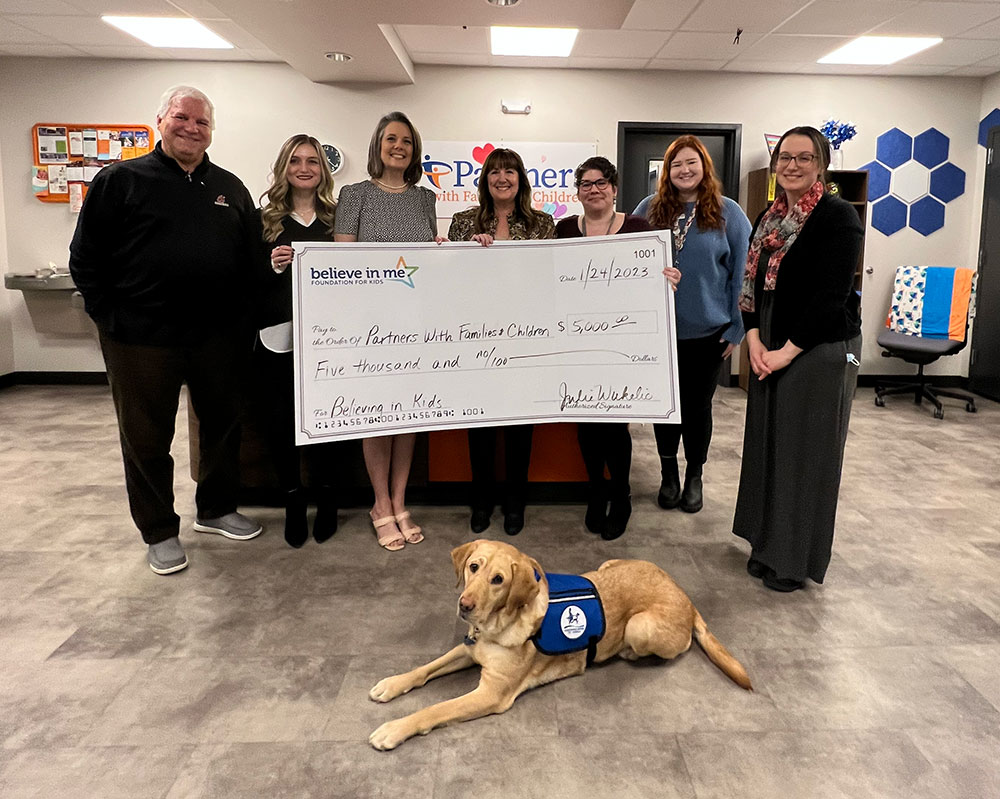Believe in Me has recently awarded a $5,000 Wraparound Services Pillar Grant to Partners with Families and Children (Partners) to establish a No-Hit Zone. The No-Hit Zone is a safe environment where no hitting is allowed. The funding provides training for Partners to promote healthy, non-violent behaviors and expressions of emotions and end corporal punishment. This blog post will explain why No-Hit Zones are essential, their impact on reducing violence in the home, and how Partners will implement this new policy.
The Importance of No-Hit Zones in Ending Corporal Punishment
No-Hit Zones are essential because they promote a safe and positive environment for children and adults alike. Corporal punishment, which involves physical punishment such as spanking or hitting, adversely affects children’s emotional and psychological well-being. A No-Hit Zone aims to raise awareness about ending corporal punishment and offer caregivers opportunities to learn about trauma-informed and evidence-based alternative discipline methods. By implementing a No-Hit Zone policy, Partners with Families and Children will become a safer place where children can learn and grow without fear of violence.How No-Hit Zones Promote Positive Behaviors and Communication Skills
Research has shown that children who experience violence are more likely to become violent themselves. By promoting non-violent behaviors and expressions of emotions, No-Hit Zones help break the cycle of violence and promote a safer environment for everyone. Children who grow up in safe and nurturing environments are more likely to develop healthy relationships, perform better in school, and have better mental health outcomes.No-Hit Zones shift social norms away from a passive ‘bystanders’ culture, where others turn away as adult/child interactions escalate, toward an active “bystander intervention” culture, where staff equipped with knowledge intervene to prevent harm and offer caregivers education on positive and effective discipline.
The purpose of a No-Hit Zone is to create and reinforce an environment of comfort and safety for children, adults, families, and staff working at any given facility or organization. While much of the initial impetus for N-Hit Zones have been to protect children, the effort has expanded to include violence prevention for all ages.
- To create and reinforce an environment of comfort and safety for children, families, and staff.
- To provide clear procedures for addressing situations in which adults are using physical discipline with children or to de-escalate a situation in which caregivers/staff begin to raise their voices or show other signs of stress and inappropriate behaviors that occur before physical discipline.
How No-Hit Zones Break the Cycle of Violence in the Home
The impact of No-Hit Zones on reducing violence in the home is significant. By creating a safe environment where no hitting is allowed, caregivers and children are encouraged to find alternative ways to deal with conflicts and emotions. Implementing a No-Hit Zone policy can help reduce the incidence of physical abuse in the home and promote positive behaviors and communication skills.
Why is Corporal Punishment So Detrimental to Healthy Childhood Development?
The effects of corporal punishment on children’s development have been well-documented. Studies have found that corporal penalties can increase aggression, lower self-esteem, and decrease academic achievement. Corporal punishment, which involves physical punishment such as spanking, has been shown to have detrimental effects on children’s emotional and psychological well-being. Here are some examples of these adverse effects:
- Increased aggression: Children who experience corporal punishment are more likely to become aggressive, leading to a cycle of violence and an increased risk of further abuse.
- Lower self-esteem: Corporal punishment can damage a child’s self-esteem and make them feel less valued, leading to feelings of shame, guilt, and inadequacy, which can have a lasting impact on their emotional well-being.
- Decreased academic achievement: Children who experience corporal punishment are likelier to have reduced academic achievement due to the emotional distress caused by the punishment or because the punishment disrupts the child’s ability to focus and learn.
- Mental health problems: Children who experience corporal punishment are more likely to develop mental health problems such as depression, anxiety, and post-traumatic stress disorder (PTSD).
- Negative parent-child relationship: Corporal punishment can damage the relationship between parent and child, leading to a breakdown in communication and trust, making it more difficult for parents to support their children’s emotional and psychological well-being.
It’s important to note that corporal punishment is ineffective and can have serious negative consequences for children. Alternative discipline methods based on positive reinforcement, communication, and respect are more effective in promoting positive behaviors and preventing negative ones. By implementing a No-Hit Zone policy, Partners with Families and Children will encourage healthier and safer environments for children and families.
Understand What Partners with Families and Children is Doing to Help Kids
Partners with Families and Children is a non-profit organization providing services to Spokane’s low to moderate-income populations. Many of their clients are involved with Child Protective Services due to being victims of abuse, neglect, or experiencing trauma. Partners offer various services, such as advocacy, counseling, and education.
Compelled by the mission to prevent, interrupt, and repair cycles of abuse and neglect within families, Partners is a social safety net for abused and neglected children who can provide holistic, supportive family services to all families across the Inland Northwest.
Everything they do – from evaluation to treatment services for children and families – prevents child abuse, encircles families with security and support, and provides treatment and care so families can thrive and children can live healthy, productive lives.
Partners provides care and treatment for all family members to restore a healthy family unit.
Believe in Me Grants $5,000 for No-Hit Zone at Partners with Families and Children
The $5,000 Wraparound Services Grant from Believe in Me will allow Partners with Families and Children to implement a No-Hit Zone policy and provide the necessary resources to promote positive behaviors and communication skills. The grant covers purchasing materials such as signage, educational materials, and training for staff and caregivers.

How Partners is Launching a No-Hit Zone to Protect Kids
Partners with Families and Children staff will undergo training to implement the No-Hit Zone policy. The training will focus on trauma-informed and evidence-based alternative discipline methods and promote positive behaviors and communication skills. Experts in the field will provide custom training tailored to the specific needs of Partners with Families and Children.
Educating their multi-disciplinary team about No-Hit Zone is vital to the program’s success. Training included staff from all departments, including administration, counseling, and advocacy. The education will focus on the benefits of No-Hit Zones and how to promote positive behaviors and communication skills. The policy and practices will be fully integrated throughout the agency and officially registered as a No-Hit Zone by April 2023.
After the staff has completed the training, Partners with Families and Children will create materials to promote and educate clients about the No-Hit Zone. The materials will include signage and educational materials to encourage the No-Hit Zone policy and provide resources for staff and caregivers. Partners will also collaborate with local organizations to spread awareness about No-Hit Zones’ benefits and encourage implementing similar procedures in other organizations and households.
The Importance of No-Hit Zones in Promoting a Culture of Non-violence
No-Hit Zones is an essential step towards reducing violence in the home and promoting healthy relationships. By creating safe environments where no hitting is allowed, organizations like Partners with Families and Children promote a culture of non-violence and provide a model for others to follow. Implementing a No-Hit Zone policy at Partners with Families and Children will impact the lives of the children and families they serve.
Partners with Families and Children is committed to providing high-quality services to their clients. Implementing a No Hit Zone policy exemplifies its dedication to creating a safe and nurturing environment for children and families. The grant from Believe in Me will allow Partners to promote positive behaviors and communication skills and provide the necessary resources to support caregivers in their efforts to end corporal punishment.
The $5,000 wraparound services grant from Believe in Me is a significant step towards implementing a No-Hit Zone at Partners with Families and Children. This policy will promote non-violent behaviors and expressions of emotions and offer opportunities for caregivers to learn about trauma-informed and evidence-based alternative discipline methods. A No-Hit Zone policy will provide children and families with a safer and healthier environment.



